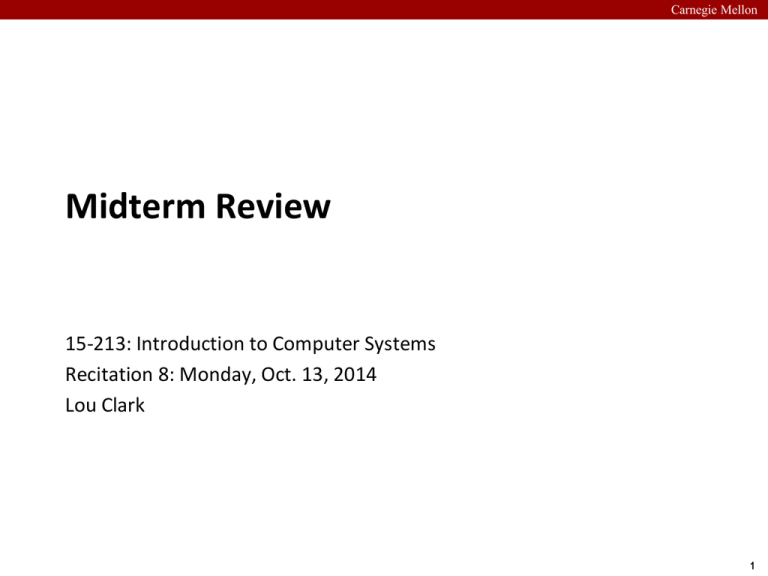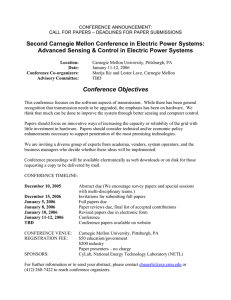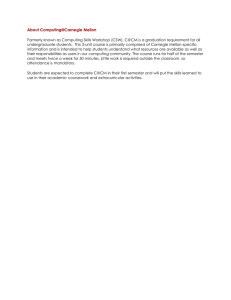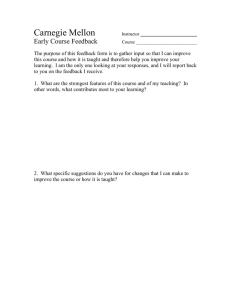Midterm Review 15-213: Introduction to Computer Systems Lou Clark
advertisement

Carnegie Mellon Midterm Review 15-213: Introduction to Computer Systems Recitation 8: Monday, Oct. 13, 2014 Lou Clark 1 Carnegie Mellon Agenda Midterm Logistics Brief Overview of some topics Practice Questions 2 Carnegie Mellon Midterm Tues Oct 14th to Fri Oct 17th. Duration – Designed to be take in 80min, but you have up to 4 hrs If you have not signed up for a slot online, do so now. You will only be allowed to take it during your slot Cheat Sheet – ONE double sided 8 ½ x 11 paper No worked out problems in that sheet No office hours after Monday After that, you can still email the list Responses might be slow due to volume, so be proactive, and read the book/lectures slides carefully beforehand 3 Carnegie Mellon Midterm What to study? Chapters 1-3 and Chapter 6 How to Study? Read each chapter 3 times, work practice problems and do problems from previous exams. Online practice exam allows you to get a feel for the format of the exam 4 Carnegie Mellon Bits, Bytes & Integers Know how to do basic bit operations by hand Shifting, addition, negation, and, or, xor, etc. If you have w bits What are the largest/smallest representable signed numbers? What are the largest/smallest representable unsigned numbers? What happens to the bits when casting signed to unsigned (and vice versa)? Distinguish between logical and bitwise operators What happens in C if you do operations on mixed types (either different size, or signedness?) 5 Carnegie Mellon Floating Point (IEEE Format) Sign, Exponent, Mantissa (−1)𝑠 × 𝑀 × 2𝐸 s – sign bit M – Mantissa/Fraction bits E – Determined by (but not equal to) exponent bits Bias (2𝑘−1 − 1) Three main categories of floats Normalized: Large values, not near zero Denormalized: Small values close to zero Special Values: Infinity/NaN 6 Carnegie Mellon Floating Point (IEEE Format) Floating Point Rounding Round-up – if the spilled bits are greater than half Round-down – if the spilled bits are less than half Round to even – if the spilled bits is exactly equal to half 7 Carnegie Mellon 8 Carnegie Mellon Assembly Loops Recognize common assembly instructions Know the uses of all registers in 32 and 64 bit systems Understand how different control flow is turned into assembly For, while, do, if-else, switch, etc Be very comfortable with pointers and dereferencing The use of parens in mov commands. %eax vs. (%eax) The options for memory addressing modes: R(Rb, Ri, S) lea vs. mov 9 Carnegie Mellon Assembly Loop 10 Carnegie Mellon Assembly – Stack How arguments are passed to a function IA-32 X86-64 Return value from a function How these instructions modify stack call leave ret pop push 11 Carnegie Mellon Given assembly code of foo() and bar(), draw a detailed picture of the stack, starting with the caller invoking foo(3, 4, 5). 12 Carnegie Mellon 13 Carnegie Mellon Array Access A suggested method for these problems: Start with the C code Then look at the assembly Work backwards! Understand how in assembly, a logical 2D array is implement as a 1D array, using the width of the array as a multiplier for access 14 Carnegie Mellon 15 Carnegie Mellon Caching Concepts Dimensions: S, E, B S: Number of sets E: Associativity – number of lines per set B: Block size – number of bytes per block (1 block per line) Given Values for S,E,B,m Find which address maps to which set Is it a Hit/Miss. Is there an eviction Hit rate/Miss rate Types of misses Which types can be avoided? What cache parameters affect types/number of misses? 16 Carnegie Mellon Questions/Advice Relax! Work Past exams! Email us - (15-213-staff@cs.cmu.edu) 17




